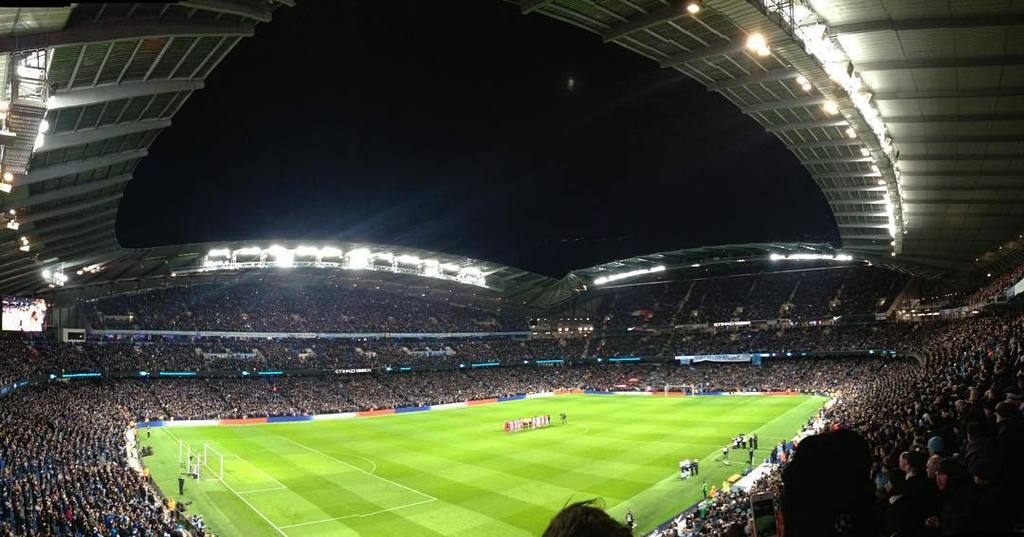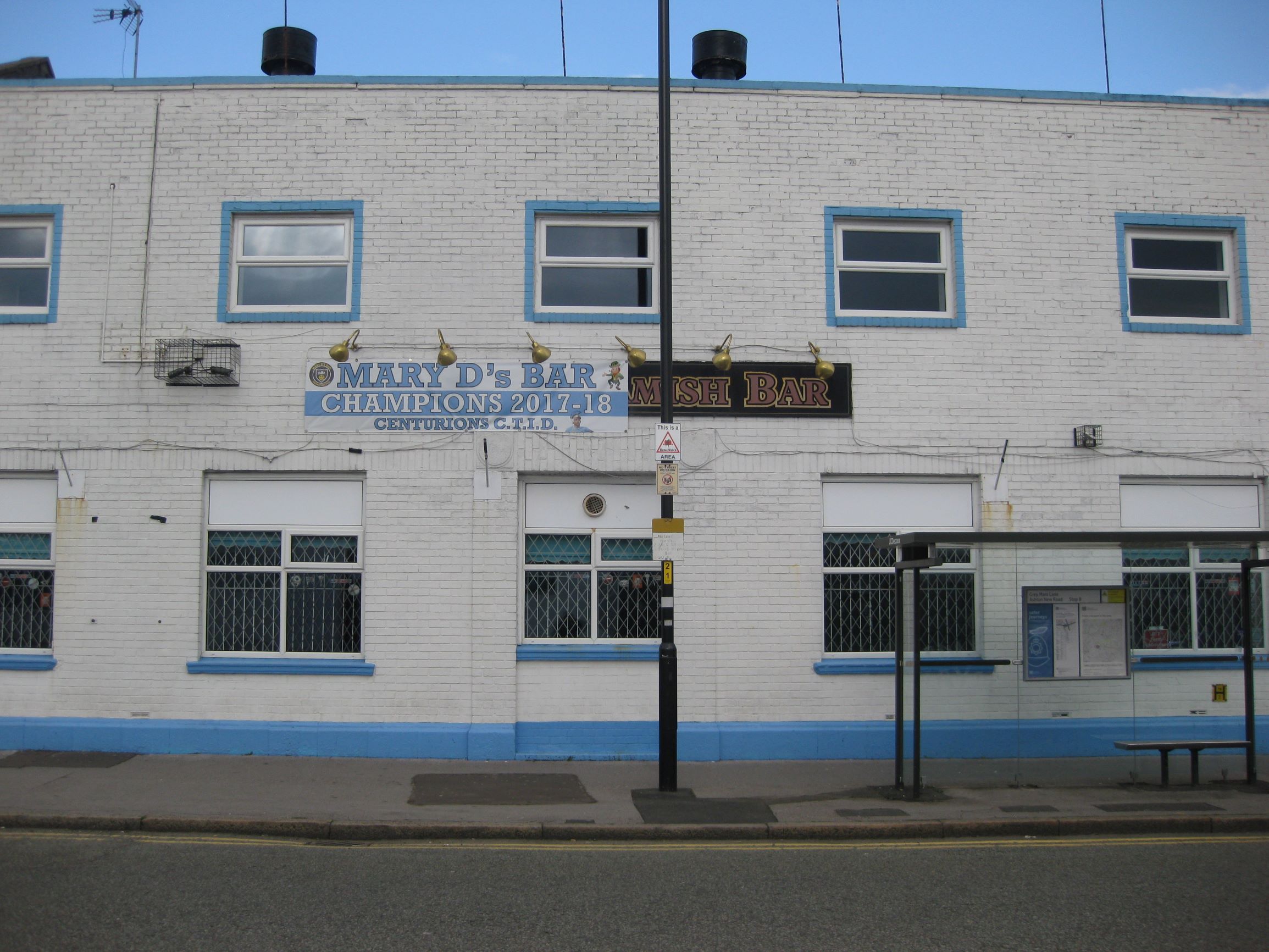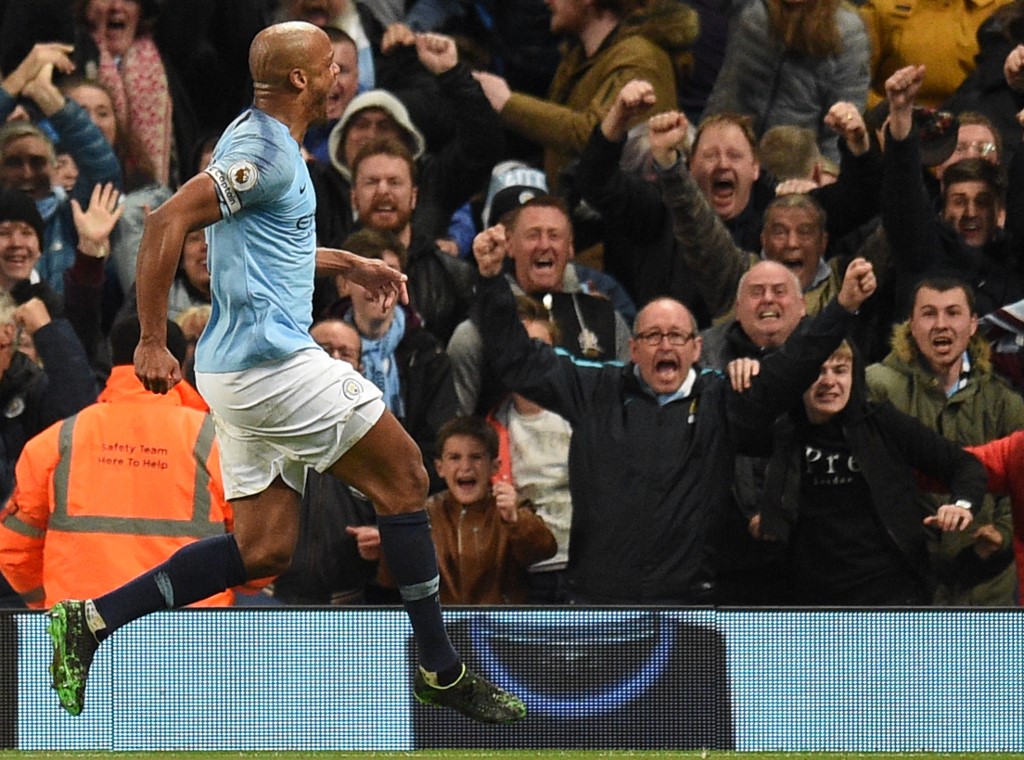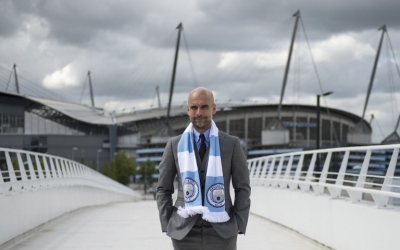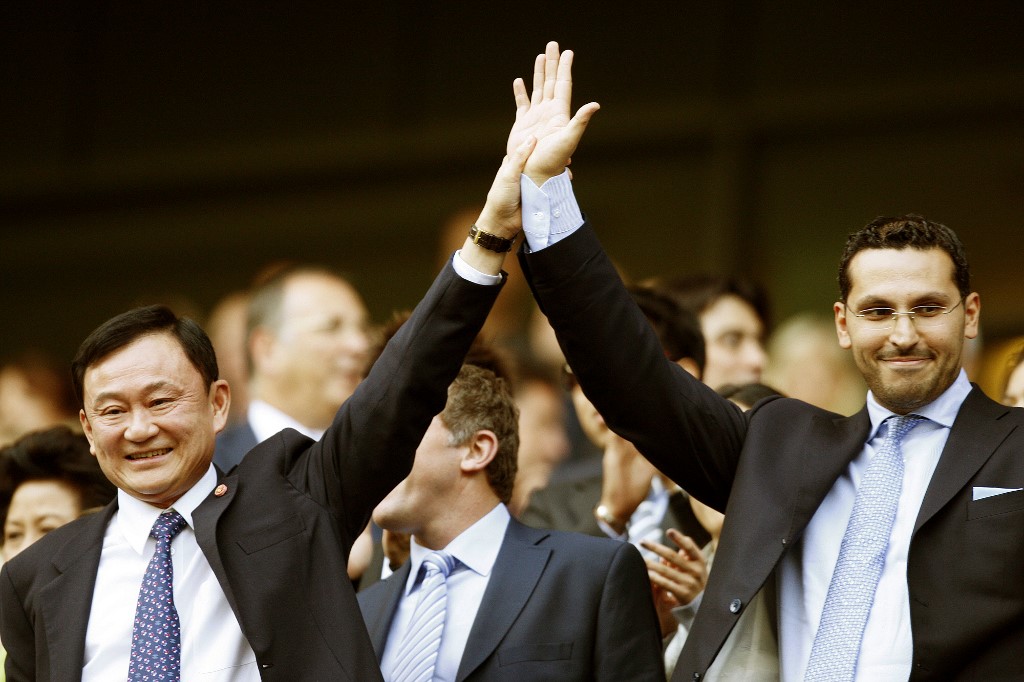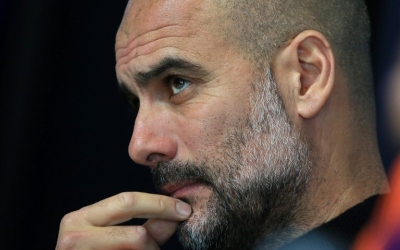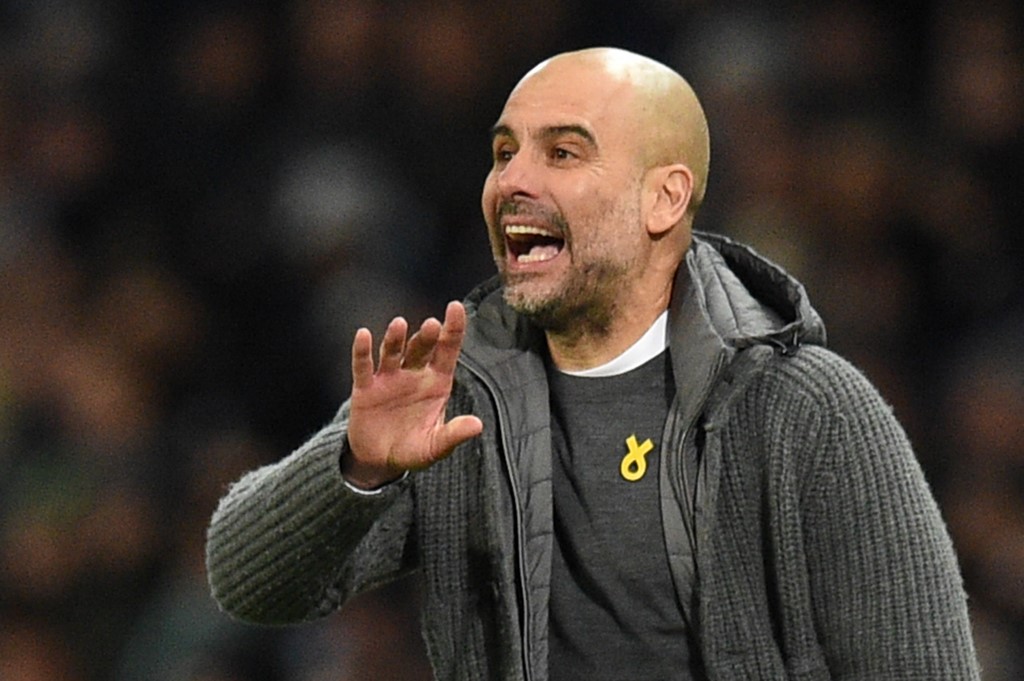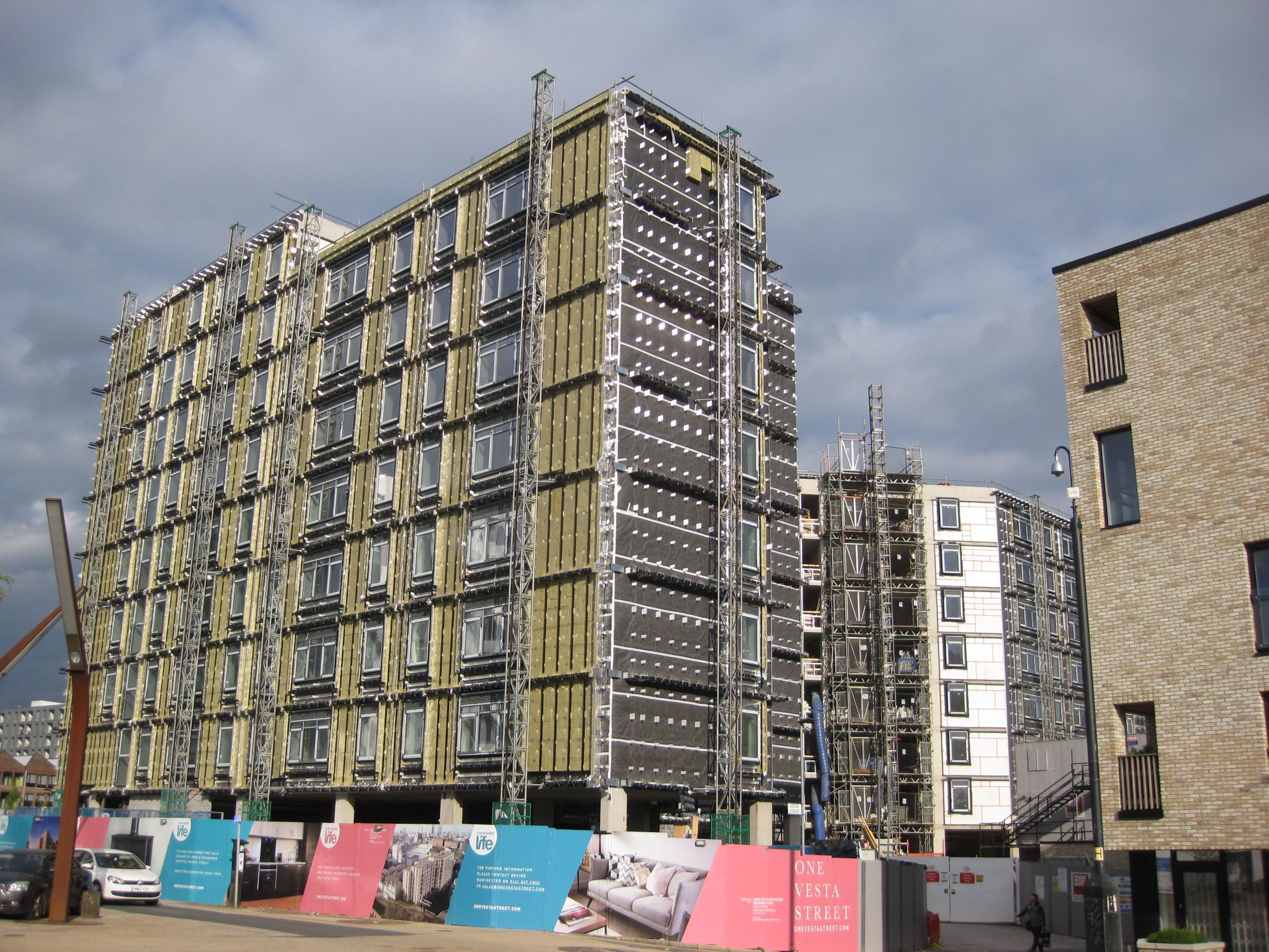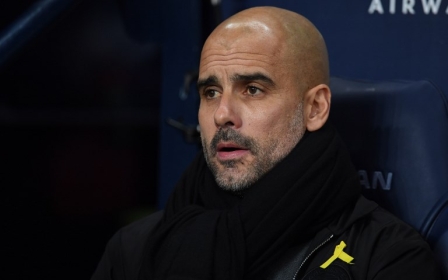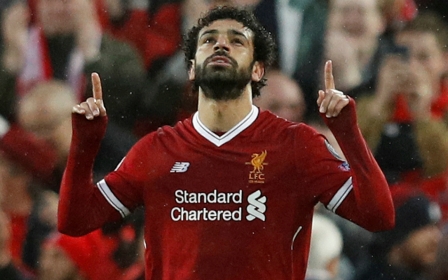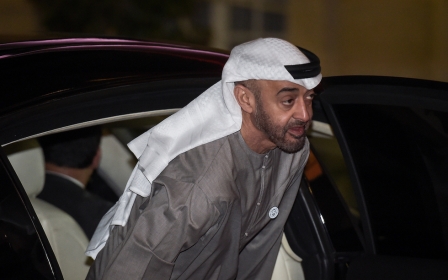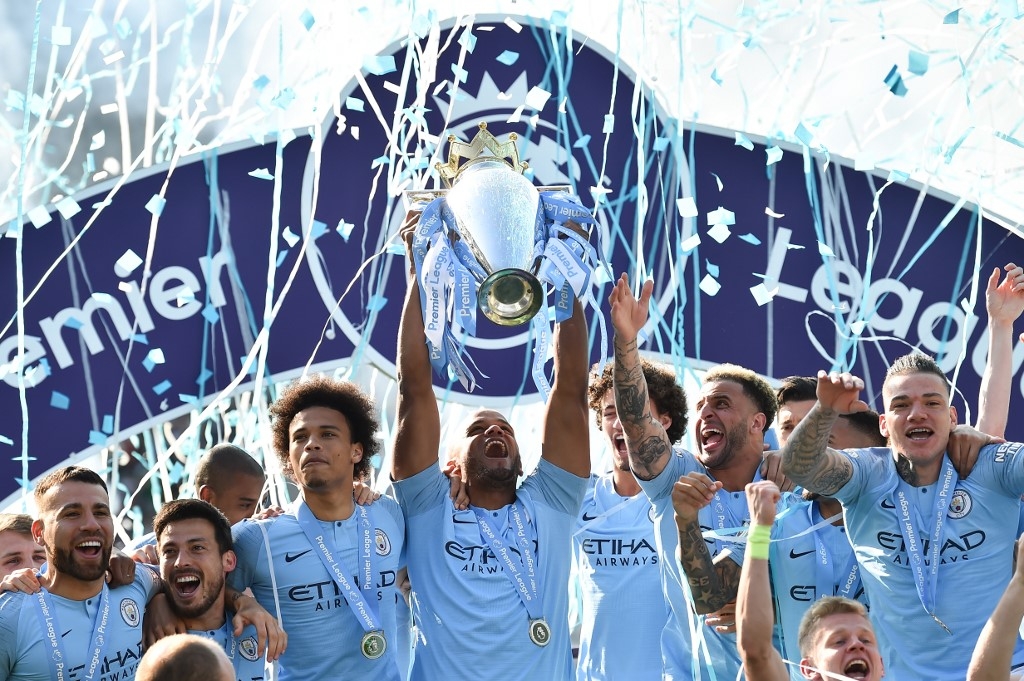
Manchester City, Abu Dhabi and the rise of English football's new order
Walk east along the tram line from Manchester's Piccadilly station and you will pass an abandoned pub called the Bank of England, boarded-up old houses and a car wash with a couple of workers in overalls sitting outside waiting for their next job.
Pass the car wash and continue up the road, and after five minutes you reach a Mercedes dealership, which sits like a guard tower outside the Etihad Stadium, home to Manchester City Football Club. The name of the United Arab Emirates’ second-largest airline can be seen everywhere.
Behind the stadium, there's the Etihad campus, a vast sweep of land populated with training pitches, a school, offices, shops, the Manchester Institute of Health and Performance, a "woodland fitness trail" and much more besides.
In the club's shop, employees tell Middle East Eye that the biggest-selling shirts are the ones you'd expect: Sergio Aguero, Raheem Sterling, Kevin De Bruyne.
These are the footballers who have fired City to a second successive English Premier League title and their fourth since 2012, justifying the money spent on them by the club's owner, Sheikh Mansour bin Zayed Al Nahyan, a prominent member of Abu Dhabi's ruling family.
After claiming the title last Sunday, the UAE's foreign minister, Anwar Gargash, tweeted in Arabic congratulating Mansour and paying tribute to his and City's "historic achievement" and "legendary success". It was, Gargash wrote, "among the most remarkable stories in the history of football".
He's not wrong. On Saturday, Manchester City face Watford in the FA Cup final, sponsored by Emirates, another airline from the UAE. If City win, they will become the first team in the history of English football to win a domestic treble of trophies - the league title, the FA Cup and the League Cup.
Over the past 10 years, Sheikh Mansour has put at least £1.3bn ($1.6bn) into the club. In return, the team's fans have unfurled banners thanking him, sung songs to him and worn homemade tea-towel keffiyehs honouring their oil-rich owners.
In more than a century of existence prior to Sheikh Mansour's arrival, City had won the English league title just twice, enjoying occasional periods of success but often bouncing between divisions and playing in the third tier of English football as recently as 1999.
"Never thought when watching City lose to Tranmere many years ago we'd be the best ever Premier League team and on the cusp of winning the domestic treble," City fan Tony told a BBC radio phone-in on Friday night.
"If you are a Manchester City supporter right now, you are living the absolute dream."
'Double-edged sword'
Premier League football "is one of the best entertainment products in the world," the UAE’s deputy prime minister wrote when he bought the club in 2008, and the City Football Group, under the ownership of Abu Dhabi United Group, is well on its way to becoming an Emirati-funded Amazon or Disney, running a string of football clubs from the US to Uruguay, Spain to China.
New York City Football Club, like Melbourne City and their parent club, Manchester City, play in sky blue, with "Etihad Airways" on the front of their shirts.
They aim to play in the style City's manager, Pep Guardiola, a Champions League winner with Barcelona as a player and a coach and whose possession and passing-based philosophy is synonymous with the Catalan club, exhorts his team to play.
As such, football, the most-watched sport in the world, has become a global advert for Abu Dhabi and a way of exercising the UAE's "Soft Power Strategy". But, as Nicholas McGeehan, the former UAE researcher for Human Rights Watch says, City's owners are "wise to the fact that it's a double-edged sword".
As the Australian Simon Pearce, a director of Manchester City and Abu Dhabi's head of strategic communications, put it in a leaked email written in 2013 regarding the club's move to New York: "AD/UAE vulnerabilities put in play: gay, wealth, women, Israel."
The success, then, of Manchester City has also brought some fresh attention to long-standing criticisms of the UAE. "This is one of the most abusive and dangerous governments out there," says McGeehan. "They are particularly sinister and dangerous."
Serious mistreatment of the migrant workers that make up 90% of the population, vast inequalities in wealth, environmental degradation, oppressive policies aimed at women and gay people, torturing prisoners and embarking on a war that has killed thousands of innocent people in Yemen: all these allegations against the UAE have been brought, however hazily, to the attention of some of the hundreds of millions of people that watch the English Premier League around the world.
This is particularly true for fans of City's rivals looking for a stick to beat their conqueror with, and particularly true in an ever more polarised football landscape, in which fan sites and podcasts have risen to prominence and supporters across the world vent at each other on Twitter.
In return, fans of the Manchester club have become what McGeehan calls an "unpaid PR army" for Abu Dhabi, defending the UAE on social media and pointing out that when it comes to supposedly dodgy owners of Premier League football clubs, City are very much not alone.
"Dig deep enough and you'll find murky business in every club's financial dealings – where there's money, there's a lot of questionable characters and practices," says David Mooney, a life-long City fan and host of the Blue Moon podcast.
Fellow fan Howard Hockin, who runs the 93:20 podcast, makes a similar point. "The UK government is just as bad as the UAE government. There is a lot of Western arrogance surrounding this," he says.
In Manchester, the men of oil-rich Abu Dhabi get a lot more love than that UK government. From time to time, City fans in the Etihad break out a chant that pays homage to their owner. To the tune of spiritual classic Kum Ba Ya, they sing "Sheikh Mansour m'lord, Sheikh Mansour, oh lord, Sheikh Mansour".
Mansour has attended one Manchester City game during more than a decade of ownership.
A Gulf state whose territory was once controlled by the British, the UAE is now calling the shots, its rulers thanked and honoured by men and women at a football ground in the north of England.
But as it aims to make domestic football history, Manchester City face another kind of off-field headache, as Europe's footballing body, UEFA ,threatens to ban it from the Champions League for violating financial fair play regulations by funnelling Sheikh Mansour's money through inflated sponsorship deals. The giant of east Manchester is being forced to swat away assorted slings and arrows.
Labour Club to superclub
On match days, Mary D's, a bar that sits just across the road from one corner of the Etihad stadium, is only open to City fans. Hundreds regularly crowd inside the main bar, take to its dance floor and fill out its outside space at the back. Pictures of players past and present line the walls.
The large patio at the back has shirts hanging down from the roof covering and the dance floor is decorated with homemade tributes to the City players who drove the team to 100 points in the league last season. Aguero and Sterling are shown with Roman helmets on, the horsehair trim on the crest coloured City blue.
The Beamish Bar hasn't always been a temple dedicated to the gods of Manchester City. Beswick, the area of east Manchester the Etihad stadium sits in, traditionally belongs to Manchester's other, more famous, football team: Manchester United.
For years, Mary D's was also the Bradford Labour Club, a home for the working people of the area. Manchester, cradle of the industrial revolution, home to the football club that has spent more money than any other in the world over the last decade, is one of the most deprived local authorities in the UK.
In 1993, an Irishman called Mike Kehoe bought the bar and took over its management. In those days, Manchester City were still playing at Maine Road, which had been their ground from 1923. Maine Road is in Moss Side, south of Manchester's city centre and about five kilometres from what is now the Etihad Stadium. The club's traditional support is drawn from those areas, not from east Manchester.
From the 1980s onwards, as government cuts, the march of global capitalism and the closing down of industry devasted large areas of the United Kingdom, Manchester's city council became adept at bidding for one-off pots of money as a way of trying to make up for the straitened circumstances they found themselves in.
In 2002, Manchester hosted the Commonwealth Games. The City of Manchester stadium was built for the event, but it needed an afterlife. Manchester City, in turmoil but still commanding loyal crowds of over 30,000 people, was the obvious choice.
On a Monday afternoon, the regulars drinking in the main bar are all United fans, despite the City-themed decor.
What I love about this place is that I could get drunk tonight and walk back home through my estate completely naked, and no one would mind
- Tommy, local resident
Tommy, Steve and Colin are all in their early 50s. Tommy is a window fitter. He grew up in Beswick and has lived here all his life.
"What I love about this place is that I could get drunk tonight and walk back home through my estate completely naked, and no one would mind," he says.
He lives in a community. There isn't much money and there isn't much opportunity, but people know and look out for each other. And, apart from on match days, they’ve still got their local pub: Mary D's.
A shadow hangs over this. You can see it from outside the bar: the Etihad Stadium and all it represents. For years, the residents of Beswick have been waiting to find out what Manchester City Football Club and Manchester City Council want to do with them and the place they live in.
"The club wants to flatten the area, but the community doesn't know what's going on," Tommy says.
Will the oil wealth of Abu Dhabi pour out into Beswick, uprooting this working class community, flattening the council housing and replacing it with loft apartments and an as-yet imagined upwardly mobile demographic, working who knows where and doing who knows what?
At Mary D's, the punters don't know. They feel like they are in purgatory. They feel like some lines from an old song of Manchester City's: "We're not really here, we're not really here, just like the fans of the Invisible Man, we're not really here."
"We just want to know what's going on,” says Tommy, his words echoed by friends at the bar. He has two daughters and wonders for their future. He bought his council house for £14,000 ($17,800) and now it's worth £150,000 ($191,000).
Like most of his fellow residents, Tommy would most likely make a substantial profit if Manchester City bought him out, but like most of his fellow residents, he doesn't want to move to another part of the city. "It's your community, and you don't want to leave," he says.
The community shares a feeling of resignation. It's David versus Goliath, they say, it's just that in this telling of the story, Goliath wins.
"They're Arabs with billions of pounds, what can we do?" Tommy asks.
The club still advertises jobs at the club that pay below £9 an hour ($11.40), which is considered the living wage in the area. It still outsources recruitment to outside companies. This certainly doesn't make it unique in the Premier League.
Only four of 20 clubs in England's top division – West Ham, Chelsea, Liverpool and Everton – have signed up to the Living Wage Foundation's definition of what a living wage for workers is.
Knocking up some signs in the car park of Mary D's, Mike Kehoe, the bar's owner, understands how his punters feel, but he has a different take on the situation, partly because it's working out well for him financially and partly because, as a City fan, it's worked out well for him personally.
The building of the City of Manchester stadium and the arrival of Manchester City across the road from his bar was a dream come true for Kehoe. When the team he loved pitched up next door to his pub, he turned the place into a shrine for City fans and hasn't looked back since.
Kehoe is relatively upbeat when it comes to Abu Dhabi's ownership of the club. "In my opinion, it's got better," he says, pointing to the club's investment in a local gym and school. "They do a lot in the community, and as a fan it's been great."
The Irishman echoes a point made by the Guardian journalist David Conn in Richer Than God, his profound and personal investigation into Manchester City and modern football: these men representing Abu Dhabi are "world-class business people".
For Kehoe as a bar owner, the arrival of the club means fans pouring through the doors on match days and people from all over the world coming to soak up the atmosphere.
Still, he sees why his local customers – his friends – feel the way they do. In return, Tommy, Steve and Colin laugh about Mike's fondness for the club: "He would say that, he's making money." But just as the future is uncertain for those drinking in the bar, it's not entirely clear for Mike and Mary D's.
'Exemplary business partners'
Manchester City Council make no assurances about what will happen to Mary D's, Kehoe says. The council of a city proud of its radical past seems to have a somewhat cosy relationship with Abu Dhabi.
In 2016, Amnesty International and Human Rights Watch wrote to Manchester leaders on the eve of the anniversary of the Peterloo Massacre, an 1819 incident in Manchester when cavalry fatally charged a more than stadium-sized crowd that had been demanding parliamentary reform amid grim post-war economic conditions. While fewer than 20 died, up to 700 were injured. The two modern-day organisations asked the council to "take some simple and principled steps that would support victims of serious human rights violations and ensure Manchester's commercial relationships with senior figures in the UAE government do not besmirch the city's reputation".
Sir Richard Leese, leader of Manchester City Council, responded, calling the rulers of Abu Dhabi "exemplary business partners" and saying that the "alleged" abuses detailed in the letter were beyond Manchester's control.
These exemplary partners had come to town at a time when Manchester City was once again in trouble, and not for the first time. The club had been through a number of false dawns, and David Conn, for one, had already lost faith in the spiritual purity of football, long before Sheikh Mansour arrived.
Investigating the economics of football as a reporter, Conn became profoundly disillusioned. The gap between the shared experience of playing and watching a game and the money-driven business of the Premier League, with its Murdoch-run television coverage and its billionaire owners, was simply too wide.
And he saw it all unfold at his beloved City. After Sheikh Mansour took over, Conn went to Abu Dhabi, where an American businessman told him that the Emiratis were "richer than god".
City were in dire straits when Sheikh Mansour arrived to save the day. Thaksin Shinawatra, the former prime minister of Thailand, had bought the club in 2007. Briefly dubbed "Frank Sinatra" by City fans and branded a "human rights abuser of the worst kind" by Human Rights Watch, Shinawatra sold up after only a season in charge.
Garry Cook, the club's Shinawatra-appointed CEO, when asked about the human rights and corruption charges levelled at his boss, had declared that Thaksin was a "great guy to play golf with." Cook was now charged with finding a new owner.
The former Nike man, who was fond of mid-Atlantic brand speak and had once worked closely with Michael Jordan, was introduced to Amanda Staveley, ex-girlfriend of Prince Andrew, and Ali Jassim, an adviser to Sheikh Mansour.
Staveley regularly acts as an intermediary between the Gulf and the City of London, and she and Jassim were also helping Mansour buy a multi-billion pound stake in Barclays bank, at the height of the global financial crisis.
'If you’re developing your nation and you’re looking to be on a global stage, we are your proxy brand'
Garry Cook, Former Manchester City CEO
In August 2008, as detailed in Joshua Robinson and Jonathan Clegg’s book The Club, Cook made a presentation to Staveley and Jassim at the City of Manchester stadium. He told them that whoever bought the club would be buying a piece of global legitimacy, a rolling PR campaign devoured by audiences all over the world.
"Nobody had ever heard of Roman Abramovich until he bought Chelsea Football Club," Cook said, referring to the Russian oligarch who had been at the forefront of the wave of foreign investment in Premier League football.
"If you're developing your nation and you're looking to be on a global stage, we are your proxy brand for the nation," Cook told Abu Dhabi's representatives.
The price was not important because you couldn't put a price on, in Robinson and Clegg's words, a "PR campaign that played fifty games a year to an audience of millions". For an image-conscious billionaire in the 21st century, a Premier League football team "was a must-have accessory".
"We all appreciate that Mansour didn't love City," says Howard Hockin, the fan and podcaster. "Abu Dhabi is an up-and-coming country, and it wanted to boost its profile. It's a PR thing, and we're fine with that."
On that day in Manchester, at the meeting with Mansour's representatives, Garry Cook was sending a message to the UAE: this football club is a blank canvas, paint whatever you want on it.
At the time, Manchester City's manager was Mark Hughes, who was nine years older than the UAE. A part of the world once known for pearl diving and piracy, and now known for vast oil wealth, Abu Dhabi was turning the tables on its former British protectors, buying up their long-standing institutions. The deal was done.
Abu Dhabi is the wealthiest and most powerful of the seven emirates that comprise the UAE. The man who controls Abu Dhabi and dictates its policy is Sheikh Mansour's brother, Crown Prince Mohammed bin Zayed, commonly known as MBZ.
Manchester City's chairman, the US-educated Khaldoon Al Mubarak, is a key lieutenant of MBZ's and is also the CEO of Mubadala, a corporation with upwards of $50bn in assets, investing vast sums of money in anything from real estate to pharmaceuticals.
Manchester City Football Club is just one of many, many investments, but it is also the investment that, Mubarak admits, has brought by far the most attention, both good and bad.
The financial fair play cloud hanging over City has its origins in a series of articles published by the German magazine Der Spiegel. The series was built around leaked internal communication that appeared to show the club using Abu Dhabi's money to pay for sponsorships, with Simon Pearce, Abu Dhabi's branding guru, writing that "we can do what we want".
As UEFA's investigation into the club is sent for its final judgement, Manchester City has hit out at what it calls a "unsatisfactory, curtailed and hostile process," describing the allegations against the club as "entirely false".
The footballing sidesteps Manchester City have been accused of taking are mirrored in the contrast between the brand Abu Dhabi projects and the actions it takes both at home and in the Middle East.
The UAE has been heavily involved in pushing this stable, authoritarian, anti-Islamist line – it's led the way
- Nicholas McGeehan, independent human rights researcher
Nicholas McGeehan, now an independent human rights researcher, believes that the new level of infamy enjoyed by Saudi Crown Prince Mohammad bin Salman following the murder last October of journalist Jamal Khashoggi has somewhat obscured the ongoing machinations of Mohammed bin Zayed and the UAE.
MBZ, after all, is considered to have played the role of a mentor figure to the younger Saudi royal. In a nice twist of fate, rumours that Mohammed Bin Salman is looking to take over Manchester United - rumours he denies - will not go away.
"The UAE has been heavily involved in pushing this stable, authoritarian, anti-Islamist line – it's led the way," McGeehan tells MEE.
"They don't care about sport," McGeehan says. "And they don't care about football. They're interested in power and money, and that's why they are interested in football. It's incredibly sophisticated the way they use it."
'An ordinary man'
For British football fans, attention was drawn to this in May 2018, when Matthew Hedges, a British PhD student who was in the UAE on a research trip, was arrested at Dubai International Airport on suspicion of spying on behalf of the British government. Hedges was detained for seven months, handed a life sentence and then pardoned following an international outcry.
Speaking to Middle East Eye, Hedges' wife Daniela Tejada says it's important football fans realise that her husband is "an ordinary man and a football fan," just like them.
When asked about Guardiola, City's manager, who is paid $19m per year and has shown his support for Catalan prisoners of conscience but refuses to answer questions about his bosses in Abu Dhabi, Tejada's response is blunt: "I wish I was offended by someone I can't take seriously, but his mouth is in the pocket of the UAE."
Tejada doesn't have a problem with Manchester City fans. She doesn't even have a problem with Abu Dhabi owning the club. But, she says, "You can tell football fans to make certain demands of their club, and to say that they won't do certain things – like going to a match – if the owners act a particular way."
Boycotting matches, she believes, would "send a message to the world and to the funders of the club".
What Tejada tells MEE about her husband's detention gives an insight into what City's beautiful, trophy-winning football washes away. Hedges was kept in a soundproof, windowless office for six months. The light alternated between blinding white and complete darkness. He was allowed no form of distraction.
Tejada says her husband was forced onto a potent cocktail of medication that included anti-depressants, anti-anxiety pills, sleeping pills and antihistamines. He remains dependent on these drugs. "The dose has been reduced to nearly a tenth of what he was on in the UAE, but he still needs to take them to function," she says.
The British academic has been diagnosed with post-traumatic stress disorder. He can wake up feeling full of energy and then, his wife says, "go swiftly downhill to be on his own with no form of distraction," thus replicating the conditions he was kept in while in detention.
"People's lives don't go back to normal just because they are released," Tejada says.
The British government has offered little support. "I bought into the story that Britain stood up for its citizens, and that it didn't put its financial interests first. I've been proven wrong," she says.
At the time of publication, Manchester City had not responded to Middle East Eye's repeated requests for comment regarding the concerns of the local community, human rights issues in the UAE, the Matthew Hedges case and Pep Guardiola's support for the Catalan independence movement.
'Racist' criticism
For the most part, Manchester City fans are happy to take the success they've been given. After all, most of them formed an attachment to the club long before Abu Dhabi came into town in its oil and gas-powered plane. Many go further, defending the club and even now calling criticism of the UAE "racist".
"The word 'Arab' is used in derogatory terms," says Howard Hockin.
"It's such bullshit," says McGeehan. "It's just bullshit that the criticism is racist. They've come up with this line recently. Suddenly the narrative is, 'Oh, you're racist for criticising the UAE'. It's bollocks."
The Matthew Hedges case spiked an interest in human rights abuses, but without a British or Western angle – notwithstanding the fact that Britain is a long-time ally and supplier of arms to the UAE - McGeehan believes that there is always a danger the attention being paid to the situation will drop away.
"When it comes to the war in Yemen, or Libya, or general torture in the Gulf, the number of people up in arms is limited," he says.
David Mooney, a City fan since the early 1990s, says that he really struggles with the question of Sheikh Mansour's ownership.
He says he's not up to speed on the allegations, but that he accepts this could be considered a cop out. He doesn't really like it when fellow fans try to take ownership for what Abu Dhabi is doing in the city of Manchester.
"What I suppose adds an extra layer to this is that I'm a gay City fan," Mooney tells MEE, "and so neither me nor my partner would be able to be ourselves in the UAE. A quick Google search will show what LGBT rights are like in the country."
And indeed it does, with all sexual relations outside of heterosexual marriage a crime and a range of extreme punishment meted out to those who break this law.
Leaving the club as a legend in 2018, the midfielder Yaya Toure, who came to City from Barcelona in 2010, gave a speech on the pitch at the Etihad in which he thanked Mansour and al-Mubarak.
"I think those guys have been so magnificent for the fans, because City has been so long in the shadow of United, and I think those guys bring happiness to the fans," he said, before thanking the supporters.
Those fans, along with Guardiola, cheered and clapped for their Emirati benefactors. The club tweeted out the speech with a heart emoji.
After decades in the shadows of their city rivals, City had knocked United off their perch and the people to thank first and foremost were in Abu Dhabi. City played sensational football, and the people to thank were in Abu Dhabi.
These triumphs, this success, the intoxicating feeling of victory and the aesthetic delight of Guardiola's teams: it is all a gift from the Gulf.
And in return, City fans pay homage to their owners, defending them on social media and championing their stewardship of the club because they know that it is the UAE that has given them this epoch of ascendency, in which they get to lord over not just their grand old neighbours but the rest of the country.
On the way back into central Manchester from the Etihad stadium, the beaten-up boozers and dilapidated council housing give way to building sites with slick corporate advertising hoardings displaying visions of sophisticated modern living.
Some of the developments belong to Manchester Life Development Company, which is owned by Manchester City Council and the Abu Dhabi United Group, a private investment and development company owned by Sheikh Mansour. Passers-by are afforded a glimpse at what they are told will be "five star luxury".
The cranes hang high and the towers rise up. Behind them, scenes of deprivation are still visible. At home, we sit on sofas and watch football, a game turned entertainment product, an intoxicating opium of the masses for this world we live in. We think about where all the money comes from. We try not to think about where all the money comes from.
"We're all hypocrites," says Howard Hockin. "Most fans attacking us don't care about human rights in the Middle East. I should care but I don't. I should care about where my shoes come from – if they've been made by slave labour – but I don't. I don't look to football for my moral code. I don't think I've sold my soul to support Man City."
This article is available in French on Middle East Eye French edition.
Middle East Eye propose une couverture et une analyse indépendantes et incomparables du Moyen-Orient, de l’Afrique du Nord et d’autres régions du monde. Pour en savoir plus sur la reprise de ce contenu et les frais qui s’appliquent, veuillez remplir ce formulaire [en anglais]. Pour en savoir plus sur MEE, cliquez ici [en anglais].


